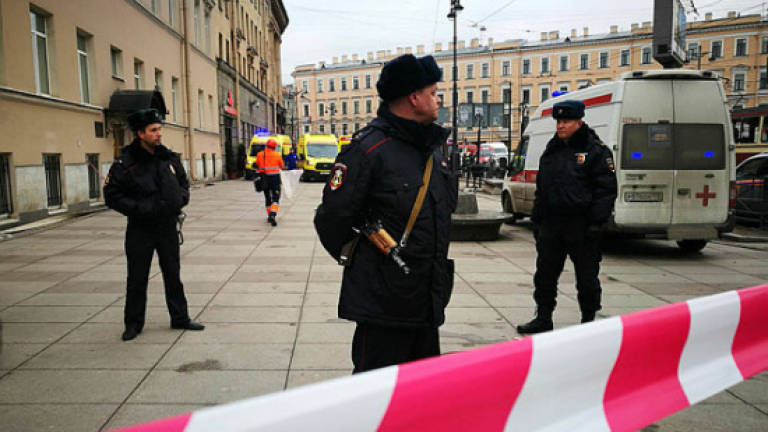Russia metro blast toll climbs to 14

SAINT PETERSBURG: The death toll from a bombing on a metro train in Russia's second city Saint Petersburg rose to 14 Tuesday, as Kyrgyzstan said a suicide bomber from the Central Asian country had staged the attack.
The Russian imperial capital was beginning the first of three days of mourning and Russian tricolour flags flew at half mast throughout the city to honour the dead.
Flowers and candles piled up at an impromptu memorial outside the metro station hit by the attack as authorities beefed up security on the city's busy underground transport system.
Commuters began their daily trip to work under an anxious cloud after Monday's bombing that closed down the entire metro system that is seen as the lifeblood of the city.
"Everyone in the metro can only think of this," said 45-year-old Svetlana Golubeva as she entered the underground.
Throughout the city, there was a sense of shock that terror could strike their city that had seemed far from being a target - unlike Paris, Berlin or London.
Even threats to Moscow "seemed far away from us," said Dmitry Leonov as he picked his way through the candles and flower tributes lining the gates of the station.
"Now we're all under threat," he said.
Act of terror
Health Minister Veronika Skvortsova said the toll from the blast had climbed from 11 to 14 Tuesday as three people succumbed to their injuries, adding that 49 more people remained in hospital.
Investigators have launched a probe into an "act of terror" but stressed they would look into other possible causes of the blast, which hit a busy central metro line on Monday afternoon.
Kyrgyzstan security services said Tuesday the attack was staged by a "suicide bomber" named Akbarjon Djalilov, a naturalised Russian citizen born in southern Kyrgyzstan in 1995.
"He is a citizen of Russia," spokesman Rakhat Sulaimanov told AFP in Bishkek, adding that Kyrgyz security services were "in contact with Russian security services."
Russian authorities have not commented on the alleged bomber's identity and it was not clear whether he counted among the dead.
There was no immediate claim of responsibility for the explosion, which comes after the Islamic State group called for attacks on Russia in retribution for its military intervention in Syria against the jihadists.
Pictures screened on national television showed the door of a train carriage blown out, as bloodied bodies lay strewn on a station platform.
President Vladimir Putin, whose hometown is Saint Petersburg, offered his own condolences and later placed a bouquet of red flowers at the entrance to one of the stations, Technological Institute.
Barbaric act
The blast occurred in a train carriage moving between two stations at 2:40pm (7:40pm Malaysia Time), said anti-terrorist committee (NAK) spokesman Andrei Przhezdomsky.
The NAK committee later confirmed that security services "neutralised" another explosive device found at a second metro station.
The chief of the Saint Petersburg metro, Vladimir Garyugin, said Tuesday that quick actions by metro staff prevented a much higher toll and that passengers had helped each other instead of panicking.
The second bomb was a bag containing the explosive device fashioned from a fire extinguisher, he said. "A metro employee quickly cordoned off the area and called in experts," he said in televised remarks.
Authorities on Monday said the Moscow metro as well as transportation hubs and crowded spots around the country were stepping up security.
German Chancellor Angela Merkel condemned the explosion as a "barbaric act," while US President Donald Trump spoke with Putin and offered "full support of the United States Government," according to a White House statement.
Russia has not been hit by an attack this deadly since the bombing of a plane carrying holidaymakers back to Saint Petersburg from the Egyptian resort of Sharm el-Sheikh in October 2015, which was claimed by IS. All 224 people onboard were killed.
Russian ground transport has also been hit by extremists before.
In 2013, twin suicide strikes within two days at the main railway station and a trolleybus in the southern city of Volgograd - formerly known as Stalingrad - claimed 34 lives and raised alarm over security at the Sochi Winter Olympic Games.
A suicide raid on Moscow's Domodedovo airport claimed by Islamic insurgents from the North Caucasus killed 37 people in January 2011. — AFP